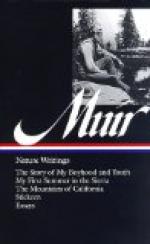III
LIFE ON A WISCONSIN FARM
Humanity in Oxen—Jack,
the Pony—Learning to Ride—Nob
and
Nell—Snakes—Mosquitoes
and their Kin—Fish and
Fishing—Considering
the Lilies—Learning to Swim—A
Narrow
Escape from Drowning and a
Victory—Accidents to Animals.
Coming direct from school in Scotland while we were still hopefully ignorant and far from tame,—notwithstanding the unnatural profusion of teaching and thrashing lavished upon us,—getting acquainted with the animals about us was a never-failing source of wonder and delight. At first my father, like nearly all the backwoods settlers, bought a yoke of oxen to do the farm work, and as field after field was cleared, the number was gradually increased until we had five yoke. These wise, patient, plodding animals did all the ploughing, logging, hauling, and hard work of every sort for the first four or five years, and, never having seen oxen before, we looked at them with the same eager freshness of conception as we did at the wild animals. We worked with them, sympathized with them in their rest and toil and play, and thus learned to know them far better than we should had we been only trained scientific naturalists. We soon learned that each ox and cow and calf had individual character. Old white-faced Buck, one of the second yoke of oxen we owned, was a notably sagacious fellow. He seemed to reason sometimes almost like ourselves. In the fall we fed the cattle lots of pumpkins and had to split them open so that mouthfuls could be readily broken off. But Buck never waited for us to come to his help. The others, when they were hungry and impatient, tried to break through the hard rind with their teeth, but seldom with success if the pumpkin was full grown. Buck never wasted time in this mumbling, slavering way, but crushed them with his head. He went to the pile, picked out a good one, like a boy choosing an orange or apple, rolled it down on to the open ground, deliberately kneeled in front of it, placed his broad, flat brow on top of it, brought his weight hard down and crushed it, then quietly arose and went on with his meal in comfort. Some would call this “instinct,” as if so-called “blind instinct” must necessarily make an ox stand on its head to break pumpkins when its teeth got sore, or when nobody came with an axe to split them. Another fine ox showed his skill when hungry by opening all the fences that stood in his way to the corn-fields.
The humanity we found in them came partly through the expression of their eyes when tired, their tones of voice when hungry and calling for food, their patient plodding and pulling in hot weather, their long-drawn-out sighing breath when exhausted and suffering like ourselves, and their enjoyment of rest with the same grateful looks as ours. We recognized their kinship also by their yawning like ourselves when sleepy and evidently




